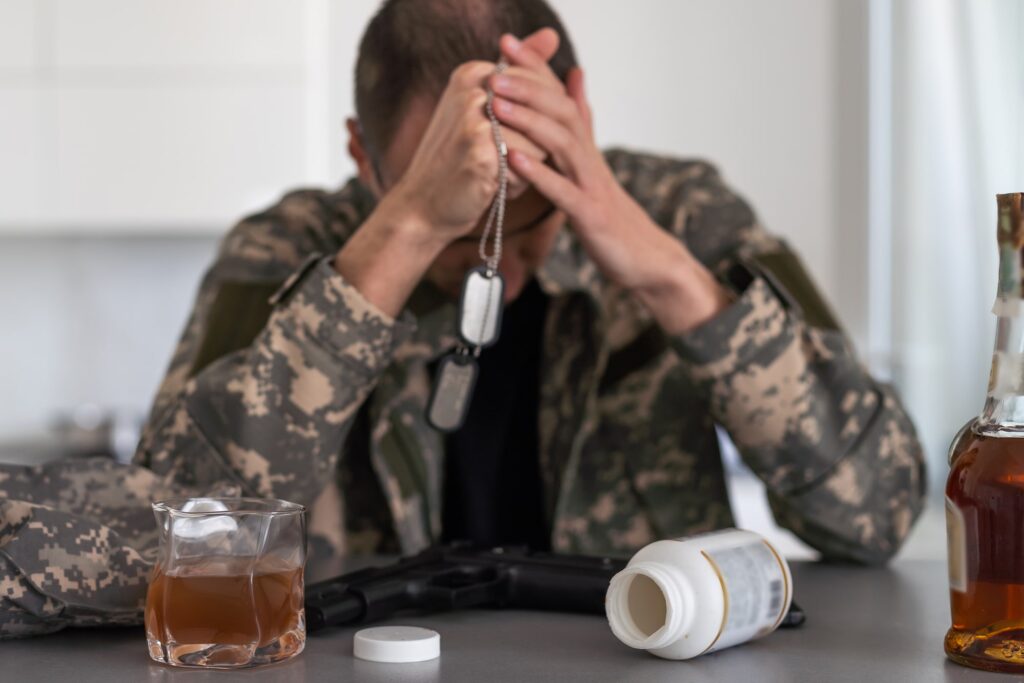In the vast terrains of battlefields, amidst the dusty trails and the ominous silence, the explosion of an Improvised Explosive Device (IED) can change a soldier’s life forever. While the immediate aftermath might involve physical injuries and the chaotic rush to safety, a more silent and insidious aftermath follows some soldiers home: the development of Alcohol Use Disorder (AUD).
For many veterans, the trauma of an IED explosion isn’t just a memory of a distant land; it’s a haunting presence that lingers, pushing them towards alcohol as a refuge. This journey from the percussive shockwaves of an IED to the quiet yet relentless grip of AUD is a testament to our veterans’ profound challenges, both on the battlefield and within their minds.
With deep sympathy, empathy, and a burning need to make a difference, Transformations Mending Fences introduced its “Help for our Heroes” program in Florida. This initiative is more than just a rehabilitation program; it’s a beacon of hope, a promise of understanding, and a pledge to stand by our veterans, guiding them toward healing and recovery.
So let’s talk about the nature of alcoholism in veterans, what are some causes, short/long-term effects and treatment remedies offered in Florida.
Call now to be connected with one of our friendly, helpful admissions specialists.
The battle doesn’t always end when the war does. For many veterans, returning to civilian life comes with its own challenges, one of which is the risk of developing Alcohol Use Disorder (AUD). The intricacies of this struggle are unique to the veteran community, shaped by experiences that the average civilian might never encounter.
Key factors to consider include:
By understanding these factors, we can better empathize with and support the veteran community in their battle against alcoholism.
Veterans stand as pillars of resilience, strength, and sacrifice. However, beneath the surface of their stoic exteriors, many face unique challenges that are seldom spoken about yet profoundly impactful. These struggles are not just remnants of battlefields but persisting issues that linger and shape their post-military lives.
Recognizing and addressing these unique struggles is crucial. Only by truly understanding can we begin to offer the necessary support, resources, and empathy that our veterans rightfully deserve.

At Transformations Mending Fences, we recognize the profound challenges many veterans face upon returning from service. We understand that the battle doesn’t always end when the war does.
The aftermath of combat stress, traumatic memories of loss, and the daunting task of reintegrating into civilian life often drive veterans towards alcohol as a sanctuary. This is further compounded by physical injuries and the emotional weight of moral decisions made during service.
While alcohol might offer a momentary escape, it often becomes a crutch, leading many military service members from casual drinking to alcohol dependence. We are here, ready and equipped, to help our heroes navigate these challenges and find their path to recovery.
One of the primary causes of alcohol abuse in veterans is the traumatic experiences they may have endured during combat. Post-Traumatic Stress Disorder (PTSD) is a severe mental health condition that affects a significant number of veterans, leading them to seek solace in alcohol as a way to numb the pain and memories.
Military culture in many nations often revolves around camaraderie and bonding, with alcohol being a common factor in such gatherings. The regular consumption of alcohol in this context can create an environment where excessive drinking becomes normalized.
Transitioning from a disciplined, structured military life to the freedoms and uncertainties of civilian life can be jarring for many veterans. This shift and the potential lack of purpose or direction can lead some veterans towards alcohol as a coping mechanism.

Alcoholism doesn’t merely touch upon veterans’ physical and mental health—it ripples through every facet of their lives, affecting their relationships, societal integration, and self-perception. The journey from being revered heroes to battling the shadows of addiction can be isolating and overwhelming. Let’s delve deeper into the far-reaching effects of alcoholism on our esteemed veterans.
The most immediate and palpable effect of prolonged alcohol abuse is on the body. Veterans with AUD often suffer from liver diseases, digestive issues, cardiovascular problems, and a weakened immune system. Additionally, alcohol can exacerbate service-related injuries, making pain management and healing more challenging.
While many veterans initially turn to alcohol as a means to cope with mental health issues like PTSD, depression, or anxiety, the irony is that prolonged alcohol consumption can worsen these conditions. It can amplify feelings of sadness, heighten anxiety, and even lead to suicidal thoughts.
Alcoholism can strain the strongest of bonds. Many veterans battling AUD find their relationships with family, friends, and loved ones deteriorating. Misunderstandings, broken promises, and erratic behavior fueled by alcohol can push people away, increasing feelings of loneliness and isolation.
Consistent alcohol abuse can render veterans less capable of holding jobs or managing financial responsibilities. Absenteeism, decreased productivity, and impaired decision-making can jeopardize their employment status, leading to economic hardships.
Having once worn their uniforms with pride and honor, the spiral into alcoholism can lead veterans to question their self-worth and identity. The stark contrast between their esteemed military role and their current struggle can be a heavy burden, affecting their self-esteem and sense of purpose.
Excessive drinking can sometimes lead to erratic behavior, which in turn can result in legal troubles. DUIs, public disturbances, or altercations can entangle veterans in the legal system, adding another layer of challenges to their lives.
Understanding these effects underscores the urgency of providing timely intervention and support. By acknowledging the depths of the challenges faced by veterans with AUD, we can begin to pave the way for their holistic recovery.
Call now to be connected with one of our friendly, helpful admissions specialists.
Alcoholism in veterans is a pressing concern that arises from a combination of combat experiences, the nature of military culture, and the challenges of reintegrating into civilian life. Society can better address the issue by understanding the root causes and its profound effects on veterans. With the proper support, treatment, and understanding, veterans can overcome alcoholism and lead fulfilling lives post-service.
The journey from the depths of addiction to a fulfilling, sober life might be challenging. Still, with tailored support, understanding, and comprehensive care, recovery is not just a possibility—it’s a promise. It’s the promise Transformations Mending Fences makes with our “Help for our Heroes” program – a testament to our commitment to helping veterans rebuild their lives.
Let’s stand together, honoring our veterans’ service and sacrifices by guiding them toward the brighter, healthier future they deserve.
Sources:
U.S. Army
https://www.army.mil/article/238762/study_prompts_re_emphasis_on_alcohol_abuse_treatment_options
National Institute on Drub Abuse
https://www.drugabuse.gov/publications/drugfacts/substance-use-military-life
RAND Corporation
https://www.rand.org/pubs/research_briefs/RB9955z7.html
Addictive Behaviors
https://www.sciencedirect.com/science/article/abs/pii/S0306460313000415
University of Michigan
https://labblog.uofmhealth.org/rounds/drug-and-alcohol-problems-linked-to-vet-suicides-especially-women